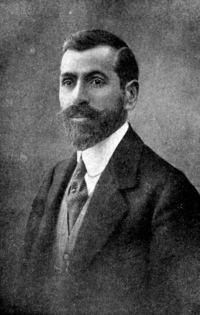Faik Ali Ozansoy facts for kids
Quick facts for kids
Faik Ali Ozansoy
|
|
|---|---|
 |
|
| Personal details | |
| Born | 10 March 1876 Diyarbakır, Ottoman Empire |
| Died | 1 October 1950 (aged 74) Ankara, Turkey |
| Nationality | Turkish |
Faik Ali Ozansoy (born March 10, 1876 – died October 1, 1950) was an important person in Turkish history. He was a politician, a poet, and a teacher. He is especially remembered for his brave actions during a difficult time.
Faik Ali was the younger brother of Süleyman Nazif, who was also a famous writer and politician. Faik Ali himself was a leading poet and writer during the Servet-i Fünun and Fecr-i Âti literary periods. During World War I, he worked as the governor of Kütahya. He is widely known for saving the lives of many Armenians during the Armenian genocide. Because he protected Armenian Christians, some people at the time called him the "governor of the infidels." Years later, in 2013, people from both Armenian and Turkish communities visited his grave to honor him.
Contents
Early Life and Family
Faik Ali Ozansoy was born as Mehmet Faik on March 10, 1876. His birthplace was Diyarbakır, a city in the Ottoman Empire. He came from a family well-known for their poetry skills.
His father, Saîd Paşa, was a respected historian from Diyarbakır. His family had Kurdish roots. His mother, Ayşe Hanim, came from a prominent Turkish tribe. Faik Ali had two sisters and a brother, Süleyman Nazif, who became a famous Turkish poet and politician.
Protecting Lives: The Armenian Genocide
During the Armenian genocide, Faik Ali Ozansoy was the governor of the Kütahya Province. When he received orders to deport people, he bravely refused to carry them out. His brother, Suleyman Nazif, even wrote to him, urging him not to "participate in this event" and to "watch out for our family's honor."
While many Armenians were being moved through Kütahya to other places, Ozansoy protected them. He offered them shelter and kept them safe. Because of his actions, he was called to Constantinople (now Istanbul) to explain why he had not followed the orders.
The writer Stepan Stepanian shared a story about Ozansoy's meeting with a powerful leader named Talaat Pasha. Talaat asked Ozansoy why he had not deported the Armenians from his town. Ozansoy replied that the Armenians in his area had always been loyal citizens. He said they had lived peacefully with the Turks like brothers.
Talaat insisted that the deportation order applied to all Armenians, with no exceptions. Ozansoy then bravely said, "If that is the case, since I don't want to be a murderer, please accept my resignation. Find someone else who is willing to carry out such a policy." After hearing this, Talaat reportedly told him, "Fine, fine. Take your Armenians and just stay in your place."
While Ozansoy was in the capital, the chief of police in Kütahya, Kemal Bey, took advantage of his absence. He forced many Armenians in the province to convert to Islam to avoid deportation. When Ozansoy returned to Kütahya, he was very upset about these forced conversions. He immediately removed Kemal Bey from his job. He then asked the Armenians if they wished to remain Muslim. All but one chose to return to their Christian faith.
After the Armenian Genocide, Armenians offered Ozansoy a gift of 500 gold coins to show their thanks. He refused the gift for himself. Instead, he asked that the gold be used to help Armenian refugees. The money was used to set up a soup kitchen and a school. Faik Ali appointed Stepan Stepanyan as the first principal of this new school.
Later Life and Career
After World War I ended and the Republic of Turkey was founded, Faik Ali Ozansoy continued his work as a politician. He later moved to Istanbul. There, he became the mayor of the Üsküdar and Beyoğlu districts.
During the government of Damat Ferid Pasha, he was appointed as an undersecretary for the Ministry of Foreign Affairs. In March 1919, he served as a governor for the Diyarbakır Province for a few months. He then returned to Istanbul. He became a French teacher at the Mulkiye Mektep School. He also wrote for a women's magazine called Süs between 1923 and 1924. From 1930 to 1932, he worked as an undersecretary for the Interior Ministry.
Faik Ali Ozansoy passed away on October 1, 1950. He is buried at the Zincirlikuyu Cemetery in Istanbul.
Literary Works
Faik Ali Ozansoy was a talented poet. Some of his well-known poetry collections include:
- Fani Teselliler (1908)
- Temasil (1912)
- Elhan-ı Vatan (1915)
He also contributed to Mehâsin, a women's magazine that started after the Young Turk Revolution in 1908.
See also
- Witnesses and testimonies of the Armenian genocide
 | Sharif Bey |
 | Hale Woodruff |
 | Richmond Barthé |
 | Purvis Young |

